Business
Zenith Bank, Access, FBN Holdings Among Top Recipients of CBN’s FX Allocation

To meet rising demand and stabilize the foreign exchange (FX) market, the Central Bank of Nigeria (CBN) recently conducted a Retail Dutch Auction System (RDAS), where Zenith Bank, Access Bank, FBN Holdings, and seven other banks received the largest FX allocations, boosting the NGX Banking Index by 5.1%.
During the auction, the CBN allocated a total of $876.26 million to 26 qualified banks at a rate of N1,495 per dollar. This system allows commercial banks to bid on behalf of their customers, with the CBN supplying the foreign currency through an auction. Out of 32 participating banks, six were disqualified for incomplete bid templates, leaving 26 banks to share about 75% of the total $1.18 billion bid amount.
Zenith Bank received the highest allocation of $267.86 million, with bid ranges from N1,500 to N1,650 per dollar. First Bank, despite recent board changes under regulatory oversight, secured $228.99 million with bids between N1,500 and N1,600 per dollar. Access Bank followed closely with $79.09 million.
Fidelity Bank, continuing its market expansion, was allocated $43.62 million, while GTCO obtained $29.54 million. Standard Chartered Bank, known for its international reach, received $28.43 million after bidding within the N1,500 to N1,600 per dollar range.
Other notable allocations included Taj Bank ($19.11 million), Jaiz Bank ($16.71 million), Sterling Bank ($14.4 million), and Union Bank ($13.27 million). These allocations not only bolstered the financial stability of the banks but also pushed the Nigerian Exchange Limited (NGX) Banking Index up by 5.1%, bringing year-to-date returns to +31.7%.
This auction marks one of the most significant FX interventions under CBN Governor Olayemi Cardoso, who is focused on stabilizing the naira and addressing ongoing FX market volatility.
Victor Chiazor, Head of Research at FSL Securities, commented on the importance of these FX allocations, noting that they are crucial for banks to meet the demands of importers, businesses, and others requiring foreign currency for international transactions. He pointed out that banks with higher allocations generally have a larger customer base or greater demand for foreign currency, reflecting their effective bidding strategies in the auctions.
Chiazor also praised the CBN’s commitment to transparency and efficiency, as demonstrated by the exclusion of the six banks with incomplete bid submissions, signaling the CBN’s intention to maintain stringent standards in future auctions.
Business
CBN expresses commitment to FX Code

The Central Bank of Nigeria (CBN) has reaffirmed its commitment to the Nigerian Foreign Exchange (FX) Code, stating that its operations align with the principles of the code.
In a statement signed by Governor Olayemi Cardoso, Deputy Governor of Economic Policy Mohammad Abdullahi, and Director of the Financial Markets Department Dr. Omolara Duke, the apex bank emphasized that its decision follows a review of the FX Global Code and recognition that the code represents a set of principles widely acknowledged as good practice in the foreign exchange market.
The statement confirmed that the CBN acts as a regulator to market participants as defined by the code and is committed to overseeing FX market activities in a manner consistent with its principles.
“To this end, the Bank has taken appropriate steps, based on the size and complexity of the FX Market, and therefore aligns its roles with the principles of the Code,” the statement added.
Business
FG launches electronic asset register to boost investment
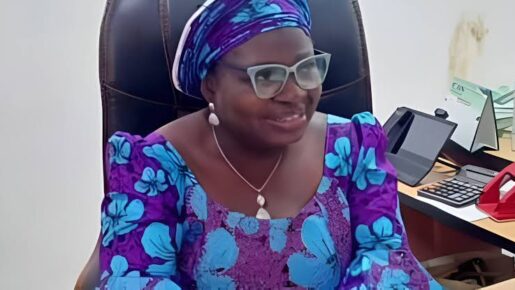
The Federal Government has launched a national electronic assets register to provide real-time access to information on government-owned assets, aiming to enhance transparency and attract more investments into the country.
The digital registry was introduced by the Accountant General of the Federation, Dr. Oluwatoyin Madein, during an event that also featured the unveiling of a compendium of FAAC allocations to federal, state, and local governments from 2020 to 2023.
Madein described the initiative as a major milestone in improving public resource management, emphasizing that it is essential for financial sustainability and integrity. She stated that the project aligns with the government’s commitment to transparency and accountability in handling public funds and assets.
She noted that giving citizens access to information about public asset management would increase government accountability. “Whether it is infrastructure, equipment, or other public property, every asset must be accounted for,” she said.
The real-time access provided by the digital register is expected to support policy formulation, budgeting, and planning. Madein explained that by having a clear understanding of the government’s assets and their conditions, policymakers can make more informed decisions on resource allocation, investment management, and potential privatisation or public-private partnerships (PPPs) for underutilized assets.
She added that the initiative also aligns with international best practices, supporting Nigeria’s adoption of the International Financial Reporting Standards (IFRS) and the International Public Sector Accounting Standards (IPSAS). These standards will help strengthen the credibility and integrity of the country’s financial statements.
On the compendium of FAAC allocations, Madein stated that it provides a detailed breakdown of revenue distribution to the three tiers of government and serves as a valuable resource for policymakers, researchers, and the general public.
Minister of State for Finance, Doris Uzoka-Aniete, who officially unveiled the compendium, praised the Accountant General’s efforts in promoting transparency and accountability. She described the electronic asset register as an important tool that will help determine the real value of Nigeria’s assets and create opportunities for local and foreign investment.
Business
Tariff increase will push available power generation to 7,000MW — Minister
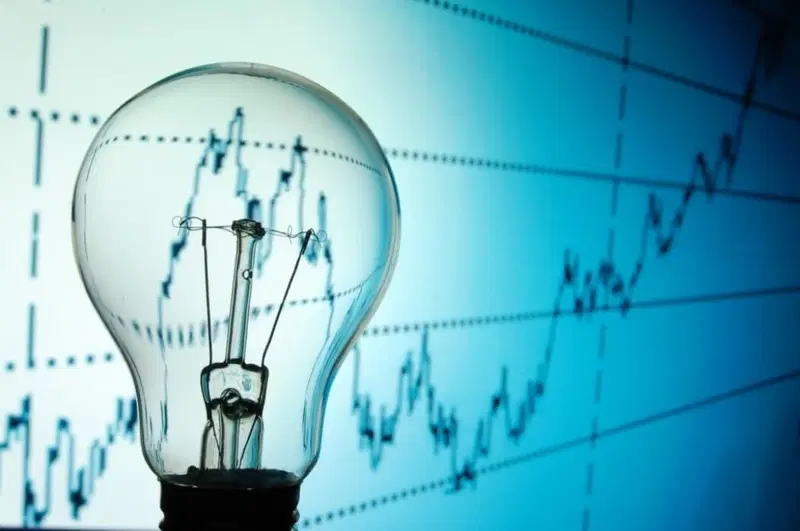
Minister of Power, Chief Adebayo Adelabu, has stated that the proposed electricity tariff increase will help boost Nigeria’s available power generation capacity to 7,000 megawatts (MW). This comes after the country recorded its highest-ever available power generation of 6,003MW and a peak evacuation of 5,801.84MW last week.
In a statement issued by his Special Adviser on Strategic Communication, Bolaji Tunji, Adelabu emphasized that tariff regularization is crucial for unlocking the sector’s full potential and sustaining ongoing improvements in power generation and distribution.
“To sustain these improvements, the government would have to pay down the tariff shortfalls of N1.94 trillion for 2024 and address legacy debts of N2 trillion to the GENCOs,” the minister said. He added that continued tariff reforms are necessary to ensure that consumers start paying for the energy they consume.
Adelabu reiterated the government’s intention to raise electricity tariffs for customers in Bands B, C, and D as part of efforts to enhance the sector’s liquidity and reduce subsidy obligations. The planned tariff hike is expected to narrow the gap between Band A customers—who currently pay higher rates—and those in lower bands.
The minister noted that Nigeria recently set another milestone with a daily maximum energy output of 128,370.75 megawatt-hours (MWh), attributing these achievements to ongoing reforms and infrastructural upgrades in the sector.
“We are thrilled to announce these historic milestones in Nigeria’s power sector,” Adelabu stated. “These achievements represent a brighter future where businesses can thrive, households can enjoy uninterrupted power supply, and the economy can grow sustainably.”
According to the minister, recent improvements result from collaborative efforts by the Federal Ministry of Power and key stakeholders to address longstanding challenges in the sector. These include the rehabilitation and upgrading of transmission and distribution networks, implementation of innovative technologies to enhance efficiency, and policy reforms aimed at improving accountability and sustainability.
While celebrating these milestones, Adelabu called for continued support from state governments, private sector stakeholders, and the general public. He stressed the need for collective action to sustain the momentum and build upon the progress made.
With power generation at a record high and tariff reforms on the horizon, stakeholders are hopeful that Nigeria’s electricity supply will see lasting improvements, ensuring stable and reliable power for businesses and households nationwide.
-

 News10 hours ago
News10 hours agoN10bn Alleged Loot: SGF Akume’s PA ,Torhile Uchi Turns Chinery
-

 News16 hours ago
News16 hours agoObi donates N20m to Colleges of Nursing in Ahiara and Ihiala
-
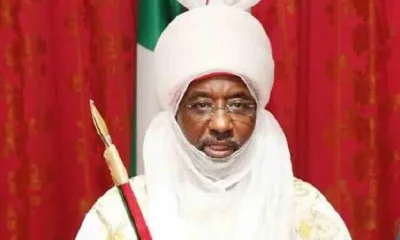
 News16 hours ago
News16 hours agoKano Emirate Tussle: Appeal Court halts Emir Sanusi’s reinstatement
-

 News7 hours ago
News7 hours agoIPOB’s lawyer accuses Anambra govt of violating citizens’ rights, wants all arrested charged to court
-
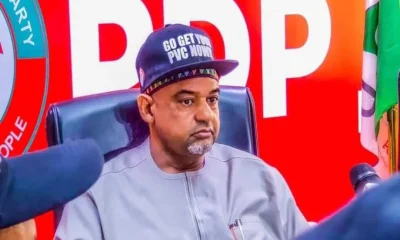
 News16 hours ago
News16 hours agoDamagum bows as PDP Govs move to re-assert ‘selves over party affairs
-
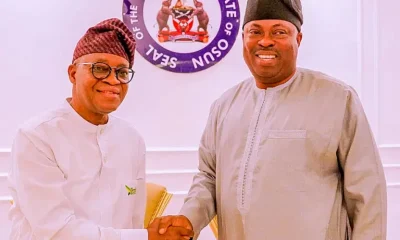
 News7 hours ago
News7 hours ago2027: Oyetola’s leadership’ll pave way for APC’s victory in Osun — ex-Speaker
-

 News7 hours ago
News7 hours agoOpposition no longer safe with recruitment of Osun PDP members into Amotekun – APM
-
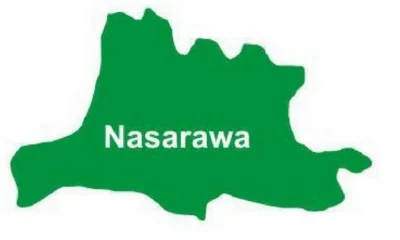
 News7 hours ago
News7 hours agoJoint patrol team neutralises notorious kidnapper in Nasarawa







